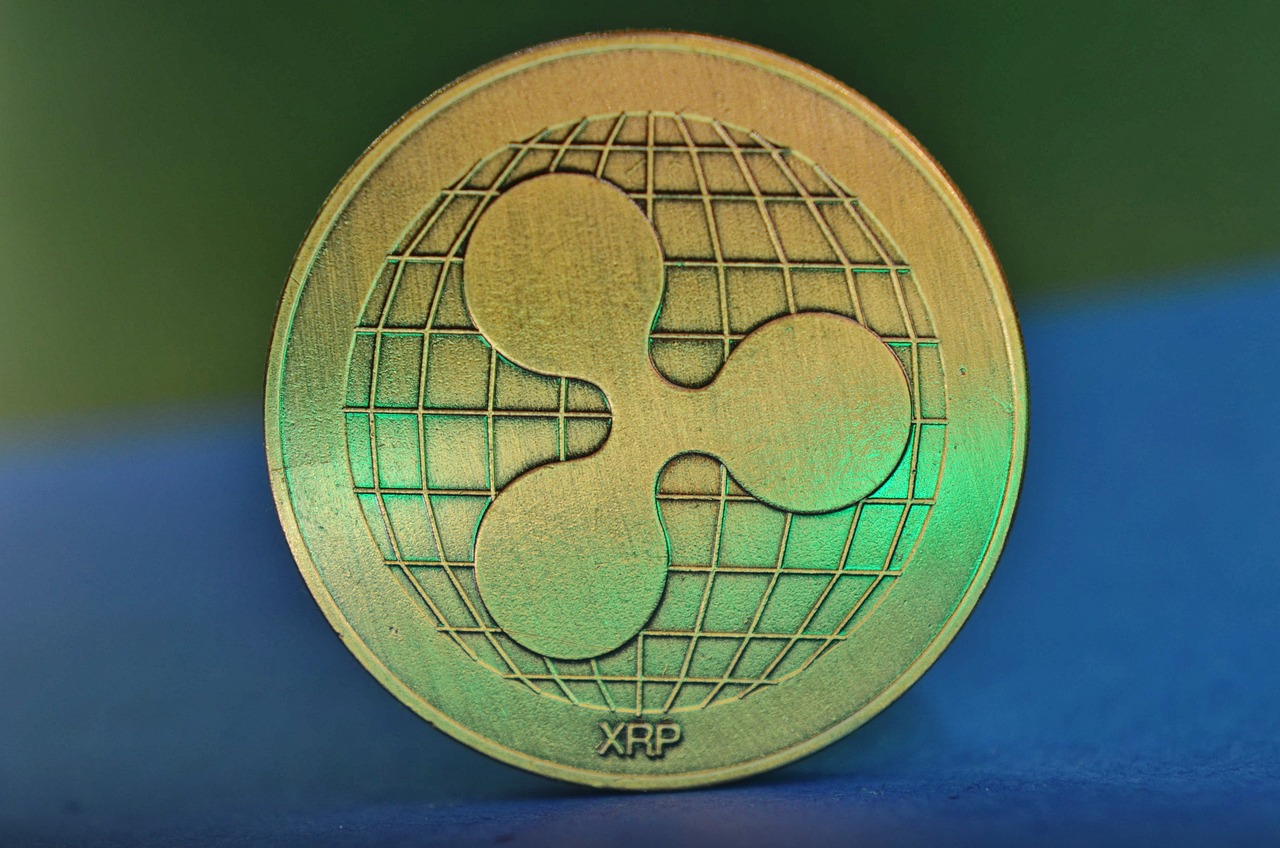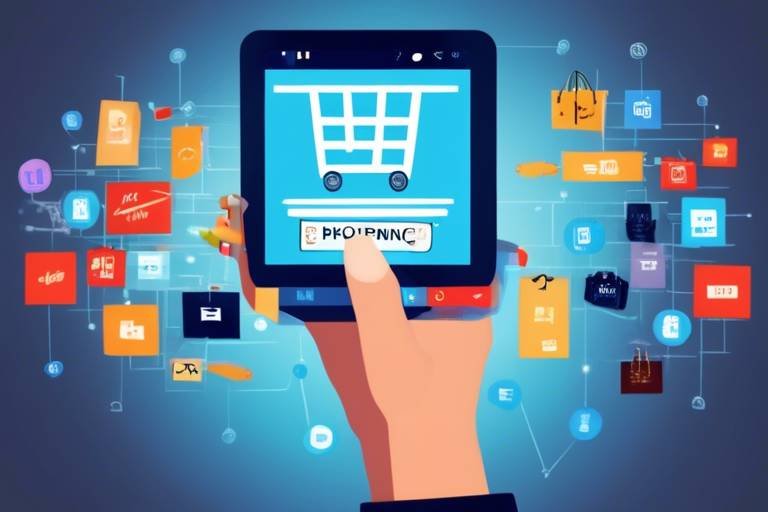The Role of Blockchain in Enhancing Trade Finance
In today's fast-paced global economy, trade finance plays a crucial role in facilitating international transactions. However, traditional systems often struggle with inefficiencies, high costs, and a lack of transparency. Enter blockchain technology, a game-changer that is revolutionizing how businesses and financial institutions conduct trade. By harnessing the power of a decentralized ledger, blockchain brings a new level of security, efficiency, and trust to trade finance.
Imagine a world where every transaction is recorded in a tamper-proof ledger, accessible to all parties involved. This is the promise of blockchain. It eliminates the need for intermediaries, reduces the risk of fraud, and enhances the overall transparency of the trade finance process. With blockchain, businesses can track their shipments in real-time, ensuring that they know exactly where their goods are at any moment. This not only fosters trust among trading partners but also streamlines operations, leading to faster transaction times and lower costs.
Moreover, the integration of smart contracts—self-executing contracts with the terms directly written into code—adds another layer of efficiency. These contracts automatically enforce agreements and trigger payments when conditions are met, removing the need for manual intervention. Imagine how much time and money businesses could save by automating these processes! The potential for reducing human error and accelerating the transaction cycle is immense.
In the following sections, we will delve deeper into the fundamental principles of blockchain technology, the current challenges faced in trade finance, and how blockchain addresses these issues head-on. We will also explore real-world case studies that highlight successful implementations of blockchain in trade finance, showcasing its transformative impact on the industry.
Blockchain is fundamentally a decentralized ledger system that records transactions across multiple computers. This means that no single entity has control over the entire database, making it inherently secure and resistant to tampering. Each transaction is grouped into a block, and once a block is filled, it is added to the chain in a linear, chronological order. This process creates a permanent and unchangeable record of all transactions.
One of the most appealing aspects of blockchain is its transparency. All participants in the network can access the same information, which significantly reduces the chances of fraud. In trade finance, this transparency can help mitigate risks associated with cross-border transactions, where trust is often a significant concern. By providing a clear and verifiable trail of transactions, blockchain empowers businesses to engage in international trade with greater confidence.
Despite its importance, trade finance is riddled with challenges that hinder its efficiency. Let's take a closer look at some of these issues:
- Inefficient Processes: Traditional trade finance processes are often manual and paper-based, leading to delays and errors.
- Lack of Transparency: Stakeholders often have limited visibility into the status of transactions, which can lead to misunderstandings and disputes.
- High Costs: The involvement of multiple intermediaries increases transaction costs, making trade finance less accessible, especially for small and medium-sized enterprises (SMEs).
These challenges not only affect the speed and cost of transactions but also pose significant risks to businesses engaged in international trade. As we explore the role of blockchain in addressing these issues, it becomes clear that this technology is not just a trend—it's a necessity for the future of trade finance.
Fraud is a persistent threat in trade finance, often leading to substantial financial losses. Blockchain technology can play a pivotal role in mitigating these risks. By providing a secure and transparent platform for transactions, blockchain makes it extremely difficult for fraudsters to manipulate or falsify records. Each transaction is verified by multiple parties, creating a robust system of checks and balances.
Smart contracts are at the forefront of blockchain's impact on trade finance. These contracts automatically execute actions when predefined conditions are met, significantly reducing the need for intermediaries. For example, once goods are shipped and verified, payment can be automatically released to the supplier without any manual intervention. This not only speeds up the transaction process but also minimizes disputes and errors.
With blockchain, real-time tracking of goods and transactions becomes a reality. This transparency benefits all stakeholders in trade finance, from exporters to importers, banks, and insurers. By having access to accurate and up-to-date information, businesses can make informed decisions, reducing the likelihood of costly mistakes.
Blockchain has the potential to significantly lower costs and improve efficiency in trade finance. By streamlining processes and reducing the need for intermediaries, businesses can enjoy faster transaction times and lower fees. The automation of tasks through smart contracts further enhances efficiency, allowing companies to focus on their core operations rather than getting bogged down in paperwork.
Several companies have successfully implemented blockchain technology in their trade finance operations, demonstrating its transformative potential. For instance, IBM and Maersk launched TradeLens, a blockchain-based platform that enhances supply chain visibility and efficiency. This initiative has allowed stakeholders to access real-time shipping data, reducing delays and improving overall logistics.
Various global initiatives are leveraging blockchain to enhance trade finance. Organizations like the World Economic Forum and International Chamber of Commerce are collaborating to explore the benefits of blockchain in streamlining trade processes. These efforts aim to create a more efficient and transparent global trade ecosystem.
The future of trade finance is likely to be heavily influenced by blockchain technology. As more businesses recognize its benefits, we can expect to see increased adoption and innovation in this space. Emerging trends such as the integration of artificial intelligence with blockchain could further enhance risk management and operational efficiency.
Q: What is blockchain technology?
A: Blockchain is a decentralized ledger system that securely records transactions across multiple computers, ensuring transparency and security.
Q: How does blockchain improve trade finance?
A: Blockchain enhances trade finance by increasing transparency, reducing fraud, and streamlining processes through automation and real-time tracking.
Q: What are smart contracts?
A: Smart contracts are self-executing contracts with the terms directly written into code, allowing for automated enforcement of agreements.
Q: Are there any real-world examples of blockchain in trade finance?
A: Yes, initiatives like TradeLens by IBM and Maersk showcase how blockchain can improve supply chain visibility and efficiency in trade finance.

Understanding Blockchain Technology
Blockchain technology is often described as a revolutionary force in the world of finance, and for good reason. At its core, blockchain is a decentralized ledger system that records transactions in a secure and transparent manner. Imagine a digital notebook that everyone can see but no one can erase. This ensures that every transaction is permanent and verifiable, which is crucial in the realm of trade finance where trust is paramount.
So, how does it work? Each transaction is grouped into a block, and once a block is filled, it gets added to a chain of previous blocks—hence the name "blockchain." This chain is distributed across a network of computers, or nodes, which means that no single entity has control over the entire system. Instead, every participant in the network has a copy of the entire blockchain, which enhances transparency and reduces the risk of fraud.
One of the fundamental principles of blockchain is its immutability. Once data is recorded on the blockchain, it cannot be altered or deleted without the consensus of the network. This characteristic is particularly important in trade finance, where documentation and transaction records must be accurate and tamper-proof to prevent disputes and fraud.
Additionally, blockchain utilizes cryptographic techniques to secure transactions. Each transaction is encrypted and linked to the previous transaction, creating a secure chain that is virtually impossible to break. This level of security is a game-changer for trade finance, where the risks of fraud and errors can lead to significant financial losses.
Moreover, the use of smart contracts—self-executing contracts with the terms of the agreement directly written into code—further enhances the efficiency of blockchain in trade finance. These contracts automatically execute transactions when predefined conditions are met, eliminating the need for intermediaries and reducing the time and costs associated with traditional trade finance processes.
To sum it up, blockchain technology is not just a buzzword; it represents a fundamental shift in how we conduct transactions. With its decentralized nature, immutability, and security features, blockchain is paving the way for a more transparent and efficient trade finance ecosystem. As businesses and financial institutions begin to understand and adopt this technology, the potential for innovation and growth in the industry is immense.

Current Challenges in Trade Finance
Trade finance is a crucial component of global commerce, yet it is fraught with challenges that hinder efficiency and transparency. One of the most pressing issues is the inefficient processes that plague many financial institutions and businesses. Traditional trade finance methods often rely on a convoluted web of paperwork, manual approvals, and intermediaries, which can lead to significant delays. Imagine trying to navigate through a maze where every turn requires a new signature or approval; that’s what many businesses face in the current landscape of trade finance.
Furthermore, the lack of transparency is a significant barrier. In many cases, stakeholders may not have access to real-time information about transactions, leading to uncertainty and mistrust. This opacity can result in disputes over the terms of trade and delays in payment, which can severely impact cash flow and operational efficiency. To illustrate this point, consider a scenario where a shipment is delayed, but the buyer is unaware of the hold-up. This lack of communication can cause a ripple effect, affecting everything from inventory management to customer satisfaction.
Additionally, the costs associated with trade finance are often exorbitant. According to industry reports, businesses can spend up to 2% of the transaction value on trade finance services due to fees, interest rates, and other hidden costs. These expenses can accumulate quickly, especially for small and medium-sized enterprises (SMEs) that may not have the same financial leverage as larger corporations. The financial burden of trade finance can limit the ability of these businesses to compete in a global market, creating an uneven playing field.
Moreover, fraud poses a significant risk in trade finance. The complex nature of international trade, combined with the lack of standardized procedures, makes it a ripe target for fraudulent activities. Instances of document forgery, double financing, and misrepresentation of goods are not uncommon. In fact, a recent study indicated that trade finance fraud costs the industry billions each year, further exacerbating the challenges faced by legitimate businesses.
In light of these challenges, it becomes clear that the traditional systems in place are not sufficient to meet the demands of modern trade. The industry needs a solution that can address these issues head-on, providing a more streamlined, transparent, and cost-effective approach to trade finance. This is where blockchain technology comes into play, offering the potential to revolutionize the way transactions are conducted and recorded, thereby mitigating many of the challenges outlined above.

Fraud and Risk Management
In the world of trade finance, fraud is not just a buzzword; it's a reality that has plagued businesses for decades. The complexity of international trade, combined with multiple parties and various jurisdictions, creates a fertile ground for fraudulent activities. But what if there was a way to turn the tables? Enter blockchain technology, a game-changer that promises to revolutionize how we manage fraud and risk in trade finance.
At its core, blockchain operates as a decentralized ledger that records every transaction in a secure and immutable way. This means that once a transaction is added to the blockchain, it cannot be altered or deleted. Imagine a world where every trade transaction is visible to all authorized parties, reducing the chances of discrepancies and fraudulent claims. This transparency is crucial in a sector where trust is paramount.
To understand how blockchain mitigates risks, consider the following aspects:
- Immutable Records: Each transaction is recorded in a block that is linked to the previous block, creating a chain of records that is tamper-proof. This makes it incredibly difficult for fraudsters to alter transaction details without detection.
- Real-time Auditing: Blockchain allows for real-time access to transaction data, enabling stakeholders to monitor activities as they happen. This immediacy helps in identifying suspicious activities before they escalate into significant issues.
- Enhanced Verification: The technology uses cryptographic techniques to verify the identity of parties involved in a transaction, ensuring that only legitimate participants can engage in trade.
Moreover, the integration of smart contracts further amplifies these benefits. These self-executing contracts automatically enforce the terms of an agreement between parties without the need for intermediaries. For instance, if a shipment of goods is not delivered by a specified date, the smart contract can automatically trigger a payment dispute or a refund. This not only streamlines processes but also minimizes the risk of fraud, as all conditions are pre-defined and transparent.
In addition to these features, blockchain's ability to provide a single source of truth is invaluable. When all parties involved in a trade transaction can access the same information, it eliminates the potential for conflicting data, which is often exploited in fraudulent schemes. This collective visibility fosters a culture of accountability, where each stakeholder has a vested interest in maintaining the integrity of the transaction.
However, while blockchain offers robust solutions for fraud and risk management, it is not a silver bullet. Businesses must still implement comprehensive risk management strategies that include due diligence, compliance with regulations, and ongoing monitoring. Blockchain can significantly enhance these efforts, but it should be viewed as a complementary tool rather than a standalone solution.
In conclusion, the integration of blockchain technology into trade finance is a promising development in the fight against fraud and risk. By leveraging its inherent properties of transparency, immutability, and real-time access, businesses can not only safeguard their operations but also build a more trustworthy trading environment. This shift is not just about technology; it's about redefining how we approach trust and security in global trade.
- What is blockchain technology? Blockchain is a decentralized digital ledger that securely records transactions across multiple computers.
- How does blockchain prevent fraud? By providing immutable records and real-time access to transaction data, blockchain reduces the chances of fraudulent activities.
- What are smart contracts? Smart contracts are self-executing contracts with the terms of the agreement directly written into code, facilitating and enforcing agreements automatically.
- Can blockchain eliminate all risks in trade finance? While blockchain significantly enhances security and transparency, it should be part of a broader risk management strategy.

Smart Contracts in Trade Finance
When we talk about smart contracts, we're diving into a realm where technology meets the legalities of trade finance in a way that can feel almost revolutionary. Imagine a world where contracts execute themselves automatically, without the need for a middleman. That’s the beauty of smart contracts! These digital agreements are built on blockchain technology and operate under predefined rules coded into them. Once the conditions are met, the contract is executed automatically, which not only speeds up the process but also reduces the potential for human error.
In the traditional trade finance landscape, we often see delays and complications arising from manual processes, which can lead to disputes and inefficiencies. But with smart contracts, the need for intermediaries—like banks or legal advisors—is significantly minimized. This is a game changer because it means that transactions can be completed in a fraction of the time, allowing businesses to focus on what really matters: growth and innovation.
Let’s break down how smart contracts enhance trade finance:
- Automation: Smart contracts automatically execute transactions when conditions are met, ensuring that all parties adhere to the agreed terms without delay.
- Cost-Effectiveness: By reducing reliance on intermediaries, businesses can save on fees and transaction costs, making trade finance more accessible.
- Transparency: All parties involved can view the contract and its execution in real-time, which fosters trust and accountability.
- Security: The decentralized nature of blockchain means that smart contracts are less susceptible to fraud, as they are immutable and securely stored across the network.
Let’s consider an example. Imagine a company in the United States looking to import goods from a supplier in China. Traditionally, this transaction would involve multiple banks, legal checks, and a lot of paperwork. However, with a smart contract in place, the agreement could automatically execute once the shipment is confirmed, releasing payment to the supplier immediately. This not only speeds up the process but also provides peace of mind to both parties, knowing that the terms are being honored without the need for constant oversight.
Moreover, the integration of smart contracts can lead to enhanced compliance with regulations. As these contracts are recorded on a blockchain, they provide an auditable trail that can be easily verified. This is particularly important in trade finance, where compliance with international regulations is crucial. Companies can demonstrate their adherence to legal requirements without the cumbersome process of manual documentation.
In summary, smart contracts represent a significant leap forward in the realm of trade finance, providing a framework that enhances efficiency, reduces costs, and increases trust among parties. As more businesses begin to adopt this technology, we can expect to see a transformation in how trade finance operates, paving the way for a more streamlined and secure global trading environment.

Real-time Tracking and Transparency
In the fast-paced world of trade finance, the ability to track goods and transactions in real-time is nothing short of revolutionary. Imagine a scenario where every stakeholder—from manufacturers to banks—can access the same information simultaneously, ensuring that everyone is on the same page. This is where blockchain technology comes into play, offering a level of transparency that was previously unimaginable.
One of the standout features of blockchain is its decentralized nature. Unlike traditional systems where data is stored in silos, blockchain operates on a distributed ledger that is accessible to all authorized parties. This means that when a shipment is initiated, every participant in the trade finance ecosystem can monitor its progress in real-time. Whether it's the shipping company, the importer, or the financial institution, everyone can see the same data, which drastically reduces the chances of miscommunication and errors.
Moreover, the transparency provided by blockchain helps to build trust among stakeholders. When everyone has access to the same information, it minimizes disputes and enhances collaboration. For instance, if a shipment is delayed, all parties can see the reason for the holdup, whether it's a customs inspection or a logistical issue—leading to quicker resolutions. This level of clarity is akin to having a well-lit room where everyone can see what’s happening, as opposed to navigating through a dark maze of guesswork.
Additionally, blockchain enables the use of smart contracts, which automate the verification of conditions and trigger actions based on real-time data. For example, once a shipment reaches its destination and is scanned, a smart contract can automatically release payment to the supplier. This not only speeds up the transaction process but also ensures that all parties are adhering to the agreed-upon terms without the need for intermediaries.
To illustrate this further, consider the following table that outlines the benefits of real-time tracking and transparency in trade finance:
| Benefit | Description |
|---|---|
| Enhanced Visibility | All parties can see the status of goods at any time, reducing uncertainty. |
| Reduced Fraud | With transparent records, the chances of fraudulent activities are minimized. |
| Faster Dispute Resolution | Real-time data allows for quicker identification and resolution of issues. |
| Improved Efficiency | Automated processes lead to faster transactions and reduced administrative costs. |
In conclusion, the integration of real-time tracking and transparency through blockchain technology is a game-changer for trade finance. It not only streamlines operations but also fosters a culture of trust and collaboration among all stakeholders. As businesses continue to embrace this innovative approach, we can expect to see a significant transformation in how trade finance operates, paving the way for a more efficient and secure global trading environment.
- What is blockchain? Blockchain is a decentralized ledger technology that records transactions across multiple computers securely and transparently.
- How does real-time tracking work in blockchain? Real-time tracking in blockchain allows all authorized parties to access the same information about a shipment, ensuring everyone is informed about its status.
- What are smart contracts? Smart contracts are self-executing contracts with the terms of the agreement directly written into code, allowing for automatic execution based on pre-defined conditions.
- How does blockchain reduce fraud? By providing transparent and immutable records of transactions, blockchain makes it difficult for fraudulent activities to occur without detection.

Cost Reduction and Efficiency
In the fast-paced world of trade finance, where every second counts and costs can spiral out of control, blockchain technology emerges as a game-changer. Imagine a world where transactions are not only faster but also cheaper—this is the promise that blockchain brings to the table. By eliminating the need for multiple intermediaries, blockchain streamlines processes and reduces the overall cost of trade finance transactions. Think of it as cutting out the middleman in a marketplace; you save time, money, and hassle.
One of the most significant advantages of blockchain is its ability to automate processes through smart contracts. These self-executing contracts with the terms of the agreement directly written into code can drastically cut down on administrative costs. For instance, instead of relying on banks or other financial institutions to verify and execute transactions, smart contracts can handle these tasks automatically. This not only speeds up the process but also minimizes human error, which can be costly in trade finance.
Moreover, the transparency offered by blockchain ensures that all parties involved in a transaction have access to the same information in real-time. This transparency reduces the chances of disputes and misunderstandings, which can lead to costly delays. By providing a single source of truth, blockchain fosters trust among stakeholders, making it easier for businesses to collaborate and innovate.
To illustrate the potential cost savings, consider the following table that outlines the traditional trade finance process compared to a blockchain-enabled process:
| Aspect | Traditional Trade Finance | Blockchain-enabled Trade Finance |
|---|---|---|
| Transaction Time | Days to weeks | Minutes to hours |
| Intermediaries | Multiple (banks, brokers) | Minimal (peer-to-peer) |
| Cost | High (due to fees) | Low (due to automation) |
| Fraud Risk | High | Low |
As you can see, the shift from traditional methods to blockchain technology can lead to significant improvements in efficiency and cost-effectiveness. Not only does this benefit individual businesses, but it also has a ripple effect on the global economy. When companies save money, they can reinvest in growth, innovation, and ultimately, create more jobs. It’s a win-win situation!
In conclusion, the integration of blockchain in trade finance is not just a trend; it’s a necessity for businesses looking to thrive in a competitive environment. By embracing this technology, companies can not only reduce costs but also enhance their operational efficiency, paving the way for a more robust and resilient trade finance ecosystem.
- What is blockchain technology? Blockchain is a decentralized ledger that records transactions securely and transparently.
- How does blockchain reduce costs in trade finance? By eliminating intermediaries and automating processes through smart contracts.
- Can blockchain improve transparency in trade? Yes, it provides a single source of truth accessible to all parties involved.
- What are smart contracts? Smart contracts are self-executing contracts with the terms directly written into code.
- Is blockchain secure? Yes, its decentralized nature and cryptographic principles make it highly secure against fraud.

Case Studies of Blockchain in Trade Finance
As we dive into the fascinating world of blockchain in trade finance, it's essential to highlight some real-world examples that showcase its transformative power. Numerous companies have embraced this technology, leading to more efficient, secure, and transparent trade processes. Let’s explore a few standout case studies that illustrate the impact of blockchain on trade finance.
One notable example is Maersk, the world's largest shipping company, which partnered with IBM to create the TradeLens platform. This blockchain-based solution aims to enhance transparency and collaboration among stakeholders in the shipping industry. By digitizing the supply chain, TradeLens allows participants to access and share shipping data in real-time. This has not only reduced paperwork but also significantly cut down delays and errors in documentation, streamlining the entire process. The results have been impressive, with participants reporting a reduction in shipping times and improved visibility across the supply chain.
Another case worth mentioning is the collaboration between HSBC and ING, which executed the first-ever live trade finance transaction using blockchain technology. By utilizing a blockchain platform known as Corda, they were able to facilitate a transaction for a shipment of soybeans from Argentina to Malaysia. This innovative approach allowed them to complete the transaction in just 24 hours, a process that typically takes several days or even weeks. The speed and efficiency gained from this blockchain application not only benefited the banks involved but also the trading companies, reducing costs and enhancing cash flow.
In addition to these examples, the We.Trade platform, developed by a consortium of banks including Deutsche Bank and Rabobank, showcases how blockchain can facilitate cross-border trade. We.Trade leverages smart contracts to automate and secure transactions, ensuring that all parties adhere to the agreed terms. This platform has empowered small and medium-sized enterprises (SMEs) to engage in international trade with confidence, knowing that their transactions are protected and monitored in real-time.
To summarize the effectiveness of blockchain in these case studies, let's take a look at the following table that outlines the key benefits observed:
| Company | Blockchain Solution | Key Benefits |
|---|---|---|
| Maersk | TradeLens | Enhanced transparency, reduced paperwork, decreased shipping delays |
| HSBC & ING | Corda | Faster transaction times, reduced costs, improved cash flow |
| We.Trade | We.Trade platform | Automated transactions, enhanced security, empowered SMEs |
These case studies underscore the potential of blockchain technology to revolutionize trade finance. By addressing longstanding issues such as inefficiency and lack of transparency, blockchain is paving the way for a more secure and streamlined trade environment. As more companies recognize the advantages of adopting blockchain solutions, we can expect to see even greater advancements in the trade finance sector.
Q: How does blockchain improve transparency in trade finance?
A: Blockchain provides a decentralized and immutable ledger that allows all parties involved in a transaction to access and verify information in real-time, significantly enhancing transparency.
Q: What are smart contracts and how do they work in trade finance?
A: Smart contracts are self-executing contracts with the terms of the agreement directly written into code. In trade finance, they automate processes and enforce agreements, reducing the need for intermediaries.
Q: Can blockchain reduce costs in trade finance?
A: Yes, blockchain can lower costs by streamlining processes, reducing paperwork, and minimizing the risk of fraud, leading to more efficient and cost-effective transactions.
Q: Are there any risks associated with using blockchain in trade finance?
A: While blockchain offers many benefits, risks include potential regulatory issues, the need for industry-wide standardization, and the challenge of integrating with existing systems.

Global Trade Initiatives
In the rapidly evolving landscape of trade finance, are stepping up to the plate, harnessing the power of blockchain technology to address long-standing issues. These initiatives are not just about improving efficiency; they are about transforming the entire trade finance ecosystem. Imagine a world where every transaction is seamless, transparent, and secure, eliminating the headaches of traditional processes. That's the vision that various organizations and coalitions are working towards.
One of the most notable initiatives is the International Chamber of Commerce (ICC), which has been at the forefront of advocating for blockchain in trade finance. They launched the ICC Blockchain Commission, a group dedicated to exploring how blockchain can enhance international trade. This commission aims to create a framework that encourages the adoption of blockchain solutions, ultimately fostering a more connected global economy.
Another significant player is the Trade Finance Distribution Initiative (TFDI). This consortium of banks and financial institutions aims to create a standardized platform that utilizes blockchain to facilitate the distribution of trade finance assets. By doing so, they can enhance liquidity and reduce risks associated with trade financing. The TFDI's approach not only promotes transparency but also encourages collaboration among financial institutions, which is crucial in a sector often characterized by competition.
Moreover, the Global Trade Connectivity Network (GTCN) is another initiative worth mentioning. It aims to leverage blockchain technology to improve the flow of information across borders, thereby reducing delays and enhancing the overall efficiency of trade. The GTCN's vision is to create a global network that connects various stakeholders, including customs authorities, shipping companies, and banks, allowing them to share information in real-time. This level of connectivity is revolutionary, as it ensures that all parties are on the same page, reducing the chances of disputes and misunderstandings.
These initiatives are not just theoretical; they are already making waves in the industry. For instance, the partnership between IBM and Maersk to create the TradeLens platform is a prime example of how blockchain can streamline the supply chain. By digitizing shipping documents and providing a single shared view of the supply chain, TradeLens enhances transparency and reduces the risk of fraud.
| Initiative | Description | Key Benefits |
|---|---|---|
| ICC Blockchain Commission | Aims to explore blockchain's potential in international trade. | Standardized frameworks, enhanced collaboration. |
| Trade Finance Distribution Initiative (TFDI) | Creates a platform for distributing trade finance assets. | Improved liquidity, reduced risks. |
| Global Trade Connectivity Network (GTCN) | Enhances information flow across borders using blockchain. | Reduced delays, improved efficiency. |
In summary, global trade initiatives are not just reshaping trade finance; they are paving the way for a more efficient, transparent, and secure trading environment. As these initiatives continue to evolve, they promise to unlock new opportunities for businesses and financial institutions alike, making the dream of a frictionless global trade experience a reality.
- What is blockchain technology?
Blockchain is a decentralized ledger system that records transactions securely and transparently, ensuring that all parties involved have access to the same information. - How does blockchain improve trade finance?
It enhances transparency, reduces fraud, and streamlines processes, making transactions faster and more secure. - What are smart contracts?
Smart contracts are self-executing contracts with the terms of the agreement directly written into code, automating and enforcing agreements between parties. - Can blockchain eliminate fraud in trade finance?
While it may not completely eliminate fraud, blockchain significantly reduces the risk by providing a transparent and immutable record of transactions. - What are some examples of blockchain initiatives in trade finance?
Notable examples include the ICC Blockchain Commission, TFDI, and TradeLens by IBM and Maersk.

Future Trends in Blockchain and Trade Finance
The future of trade finance is poised for a monumental shift, largely fueled by the advancements in blockchain technology. As we look ahead, several key trends are emerging that promise to reshape the landscape of international trade and finance. One of the most exciting prospects is the integration of artificial intelligence (AI) with blockchain. Imagine a world where AI algorithms analyze vast amounts of trade data in real-time, predicting market shifts and enabling businesses to make informed decisions swiftly. This synergy could lead to smarter, more efficient trade operations.
Moreover, the rise of decentralized finance (DeFi) is another trend that cannot be overlooked. DeFi platforms are revolutionizing traditional financial systems by eliminating intermediaries, thereby reducing costs and enhancing transaction speed. With blockchain at the core, these platforms provide a more accessible and transparent way for businesses to secure financing and manage their trade operations. It's like having a financial advisor that operates 24/7, always ready to assist without the hefty fees!
Additionally, we are likely to see an increase in collaborative ecosystems among companies, financial institutions, and regulatory bodies. By working together on blockchain initiatives, these entities can establish standardized protocols that enhance interoperability and trust. This collaboration could lead to the creation of a universal trade finance platform, where all parties can access and share information seamlessly. Picture a digital marketplace where every transaction is recorded transparently, reducing the risk of disputes and fraud.
Another significant trend is the adoption of green finance initiatives within trade finance. As sustainability becomes a priority for businesses worldwide, blockchain can play a crucial role in tracking and verifying the environmental impact of trade activities. This could involve using blockchain to certify that goods are sourced sustainably or to ensure compliance with environmental regulations. In essence, blockchain could serve as a digital guardian of the planet, ensuring that trade practices align with global sustainability goals.
Finally, we can expect to see a rise in digital identities and tokenization of assets in trade finance. By creating secure, blockchain-based digital identities for businesses and individuals, the verification process becomes faster and more reliable. Tokenization allows physical assets to be represented digitally, facilitating easier transactions and ownership transfers. This could revolutionize how trade is conducted, making it as simple as a click of a button.
In summary, the future of blockchain in trade finance is not just about technology; it's about transforming the way we think about trade itself. As these trends unfold, businesses that embrace blockchain will not only enhance their operational efficiency but also position themselves as leaders in a rapidly evolving market. The journey has just begun, and the possibilities are as vast as the global trade routes themselves!
- What is blockchain technology?
Blockchain is a decentralized ledger system that records transactions across many computers, ensuring that the recorded information cannot be altered retroactively. - How does blockchain improve trade finance?
Blockchain enhances trade finance by increasing transparency, reducing fraud, and streamlining processes through automation and real-time tracking. - What are smart contracts?
Smart contracts are self-executing contracts with the terms of the agreement directly written into code. They automate and enforce agreements between parties without the need for intermediaries. - What are the benefits of using blockchain in trade finance?
Benefits include lower costs, improved efficiency, enhanced security, and increased trust among parties involved in trade transactions.
Frequently Asked Questions
- What is blockchain technology?
Blockchain technology is a decentralized ledger system that records transactions in a secure and transparent manner. It operates through a network of computers, ensuring that all participants have access to the same information, which helps in reducing fraud and enhancing trust among parties involved.
- How does blockchain improve trade finance?
Blockchain enhances trade finance by providing greater transparency, reducing costs, and streamlining processes. It allows for real-time tracking of goods and transactions, which minimizes the risk of fraud and errors, ultimately leading to a more efficient trade finance system.
- What are the main challenges in trade finance?
Trade finance faces several challenges, including inefficient processes, high transaction costs, and a lack of transparency. These issues can lead to delays, increased risks, and higher costs for businesses involved in international trade.
- Can blockchain reduce fraud in trade finance?
Yes, blockchain can significantly reduce fraud in trade finance. By providing a secure and transparent record of transactions, it makes it much harder for fraudulent activities to occur. Each transaction is recorded in a way that is immutable, meaning it cannot be altered or deleted without consensus from all parties involved.
- What are smart contracts and how do they work?
Smart contracts are self-executing contracts with the terms of the agreement directly written into code. They automate and enforce agreements between parties, eliminating the need for intermediaries and reducing the potential for disputes. In trade finance, they can streamline processes such as payments and document transfers.
- How does real-time tracking benefit trade finance?
Real-time tracking allows all stakeholders to monitor the status of goods and transactions as they happen. This transparency helps in reducing uncertainties and fosters trust among parties, making the entire trade finance process more efficient and reliable.
- What are the cost benefits of using blockchain in trade finance?
Blockchain technology can lower costs in trade finance by reducing the need for intermediaries, speeding up transaction times, and minimizing errors. This leads to fewer delays and lower operational costs, which can significantly enhance profitability for businesses engaged in international trade.
- Are there any successful case studies of blockchain in trade finance?
Yes, several companies have successfully implemented blockchain in their trade finance operations. These case studies often highlight improvements in efficiency, reduced costs, and enhanced security, showcasing the transformative potential of blockchain technology in the industry.
- What global initiatives are using blockchain for trade finance?
Various global initiatives are leveraging blockchain to enhance trade finance, including collaborations between banks, fintech companies, and regulatory bodies. These initiatives aim to create standardized practices and frameworks that facilitate smoother and more secure international trade.
- What does the future hold for blockchain in trade finance?
The future of trade finance is likely to be heavily influenced by advancements in blockchain technology. Emerging trends include increased adoption of smart contracts, greater collaboration between stakeholders, and the development of new solutions that enhance efficiency and security in trade finance processes.



















